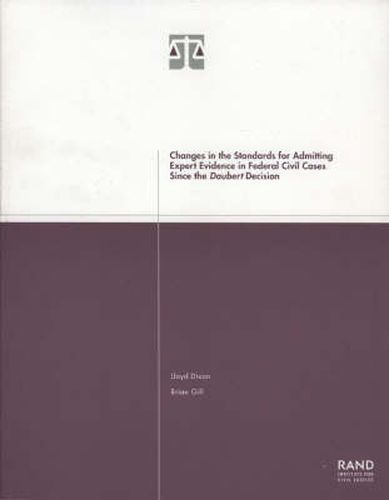Readings Newsletter
Become a Readings Member to make your shopping experience even easier.
Sign in or sign up for free!
You’re not far away from qualifying for FREE standard shipping within Australia
You’ve qualified for FREE standard shipping within Australia
The cart is loading…






The U.S. Supreme Court’s 1993 Daubert decision directed federal judges to scrutinize the reliability of expert evidence proposed for admission at trial. This study uses a sample of federal district court opinions between 1980 and 1999 to examine how judges, plaintiffs, and defendants responded to the new directive. The authors find that after Daubert, judges increasingly evaluated the reliability of expert evidence. A rise in both the proportion of challenged evidence found unreliable and the proportion of challenged evidence excluded suggests that the standards for admitting evidence tightened. A subsequent fall in these two proportions suggests that the parties proposing and challenging evidence responded to the change in standards. The study also examines how general acceptance of proposed evidence in the expert community enters the reliability assessment and which types of evidence were affected by Daubert. The authors caution that even though judges are more actively screening expert evidence, whether they are doing so in ways that produce better outcomes has not been determined. The study concludes by identifying gaps in what is known about how well federal courts screen expert evidence and by recommending research to help fill those gaps.
$9.00 standard shipping within Australia
FREE standard shipping within Australia for orders over $100.00
Express & International shipping calculated at checkout
The U.S. Supreme Court’s 1993 Daubert decision directed federal judges to scrutinize the reliability of expert evidence proposed for admission at trial. This study uses a sample of federal district court opinions between 1980 and 1999 to examine how judges, plaintiffs, and defendants responded to the new directive. The authors find that after Daubert, judges increasingly evaluated the reliability of expert evidence. A rise in both the proportion of challenged evidence found unreliable and the proportion of challenged evidence excluded suggests that the standards for admitting evidence tightened. A subsequent fall in these two proportions suggests that the parties proposing and challenging evidence responded to the change in standards. The study also examines how general acceptance of proposed evidence in the expert community enters the reliability assessment and which types of evidence were affected by Daubert. The authors caution that even though judges are more actively screening expert evidence, whether they are doing so in ways that produce better outcomes has not been determined. The study concludes by identifying gaps in what is known about how well federal courts screen expert evidence and by recommending research to help fill those gaps.